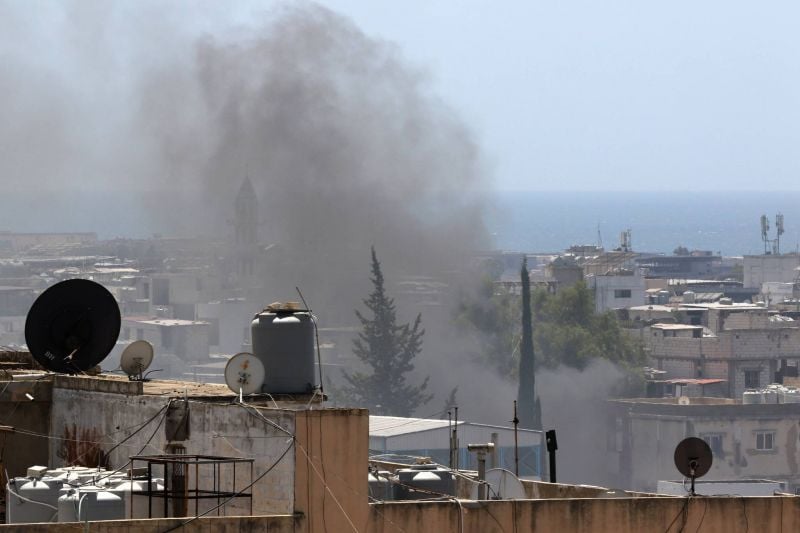
Smoke billows during clashes between Fatah movement and Islamists inside the Ain al-Hilweh Palestinian refugee camp, Lebanon's largest Palestinian refugee camp, in the southern coastal city of Saida on July 30, 2023. (Credit: Mahmoud Zayyat/AFP)
BEIRUT — Clashes continued for a third day in a row on Monday between Palestinian factions in the Ain al-Hilweh camp near Saida, leaving at least eight dead, dozens injured and dozens more displaced as families fled for safety.
L’Orient Today talked to Mohanad Hage Ali, a researcher at the Malcolm H. Kerr Carnegie Middle East Center about the possible reasons behind the deadly clashes, and their broader implications for Lebanon.
Which factions are involved in the clashes and why?
Islamic movements — of which there are many — have a good relationship with Hamas and Hezbollah but are clashing with Fatah and its factions. This [clash] comes less than a week after the visit of the head of Palestinian intelligence to Lebanon, Majed Faraj, who is associated with Fatah. Faraj is trying to counter the influence of Hamas in Lebanon.
The new reality is that Hamas has a heavy presence in Lebanon since the main political leadership is now in the country, which will have implications on the ground in Lebanon.
The country will be affected by the presence of the Palestinian leadership.
Is there a bigger risk of wider clashes in the coming few days or weeks?
I don't think the situation will escalate, and I don't see it blowing up out of proportion. However, we have seen such clashes on a regular basis; they will die down, and then erupt back again.
Currently, there's a war of attrition within the camp and each side is trying to prove itself and trying to take over the camp.
What will the consequences be for Lebanon?
This is the general trend within the country. The security situation is deteriorating very slowly but surely, and security forces don't possess the same possibilities they had before the crisis
They are all in survival mode, and that’s impacting their ability to contain the security situation in general.
Overall, I think this is an extra challenge that falls within the same trend. [The recent fighting] is one of the accelerators [of the state's inability] to showcase sovereignty and enforce security.
Some spectators claim that the timing of the clashes is not a coincidence, given the current situation. Is there any possibility that those clashes are being triggered by outside forces?
There is a relationship between a weaker Lebanese state and internal divisions within Lebanon, and security problems within Palestinian camps.
The weaker the Lebanese state and the more divided the political scene, the more likely that clashes are to happen.
It's an opportunity for those movements; the issue is deeper than those clashes and is related to the centrality of Lebanon in Palestinian events, a central scene for Palestinian politics.
Fatah is playing a stronger role in the West Bank, [where] it is trying to push back against “jihadist groups.”
Interactions in Palestinian politics will be played on the Lebanese scene.